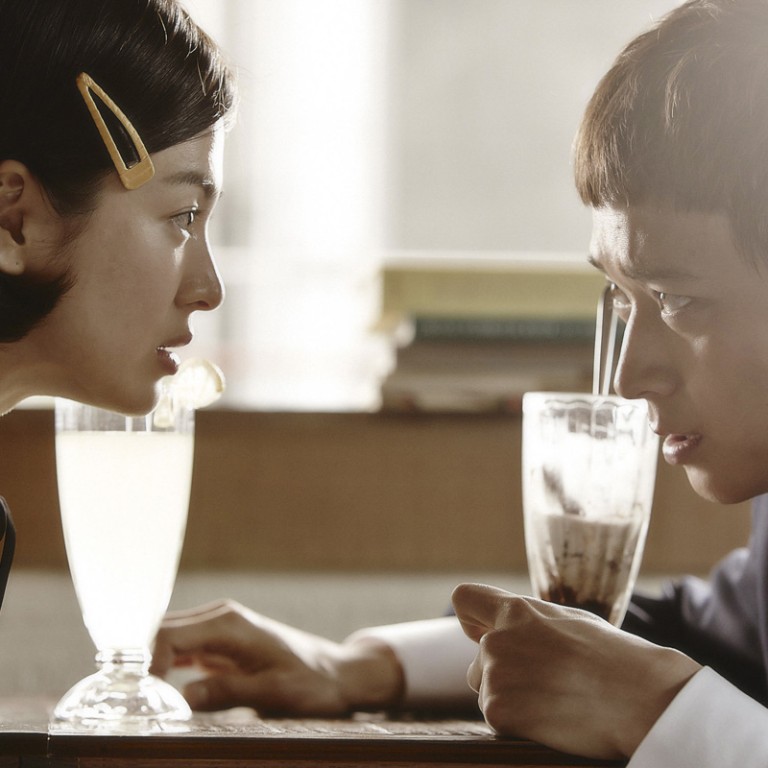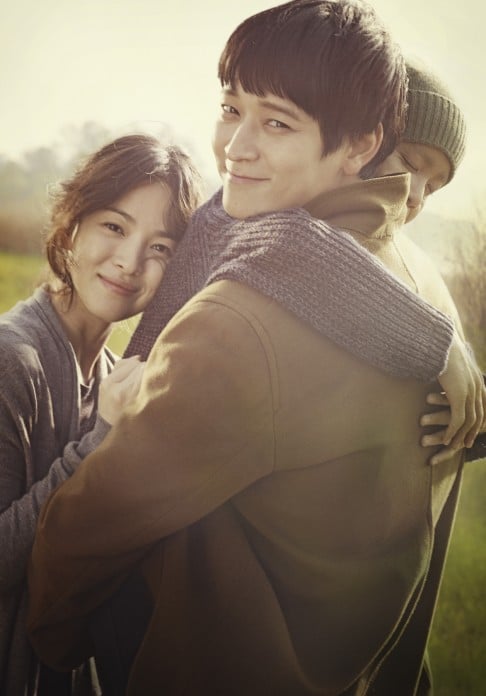
Kang Dong-won and Song Hye-kyo talk about learning life lessons from My Brilliant Life
South Korean stars Kang Dong-won and Song Hye-kyo learned valuable personal and professional lessons from their latest roles
Song Hye-kyo and Kang Dongwon are superstars in their native South Korea, and they reached that status long ago. Both enjoyed early success, making professional debuts in their teens – the actress in television drama First Love (2000), and Kang as a model before trying his hand at acting. Now in their early 30s, they are both in their prime, and in their new film, My Brilliant Life, they play parents for the first time.
The film is based on Kim Ae-ran’s bestselling 2011novel, My Palpitating Life, about a 17-year-old boy, Ah-reum, who suffers from progeria, a rare genetic condition which causes premature ageing.
Looking like an 80-year-old and realising his time may be running out, the teenage Ah-reum sets out to write a story about how his young parents fell in love.
“As soon as I read the script I was drawn to it,” says Song. “I liked the humanistic focus of the story, and I have a lot of trust in director E J-yong, so I agreed to do it immediately.
” She happened to mention the project to Kang, who is in the same management company. The two have been friends since appearing together in Jang Joon-hwan’s Love for Sale (2010), and move in the same social circles. “He showed a great interest in the story, so I told him to ask for the script,” the actress recalls.
“To be honest, I cried when I read the screenplay,” says Kang. “I could really sympathise with the characters.”
Playing a father was a challenge at first. “I don’t have the experience of being a father in real life, so it took some time for me to feel comfortable with that aspect of the role,” Kang says.
For both Song and Kang, another attraction of this film was the prospect of working with director E J-yong (who has adopted a phonetic spelling for his name; the more conventional transcription would be “Lee Jae-yong”). Perhaps best known for his 2003 hit Untold Scandal, which transposed Pierre Choderlos de Laclos’ Les Liaisons Dangereuses to the 18th century Joseon dynasty Korea, the director has in recent years focused on low-budget experimental works like Actresses (2009) and Behind the Camera (2013).

E’s return to commercial filmmaking has resulted in a movie that feels somewhat restrained and refined compared to the average South Korean melodrama, but nonetheless provokes floods of tears. “He doesn’t like exaggerated gestures or emotions in his films,” says Song. “He worked hard to bring out the subtlety of our performances.”
That meant using very few close-ups, says Kang. “It was a slightly different experience, shooting this film.”
Male viewers and parents have responded particularly strongly to this drama, which took in 12.3 billion won (HK$90.9 million) at the South Korean box office.
The roles required a fair amount of preparation before shooting. “The first thing we did was learn more about progeria,” says Song. “Together with the director, we watched a lot of documentaries on the subject, and discussed it extensively. It’s quite heartbreaking, when you learn about it in detail.
“We also had some debate early on about the visual look of our characters,” she says. “The director’s instinct was to go against the polished image that we’ve had as actors up to this point. I completely understood him, but I also worried that if it went too far it might look forced, or too deliberate. In the end I think we found a good compromise.”
But without question, the actor who worked hardest and made the most sacrifices in this film was 13-year-old Jo Sung-mok, who played Ah-reum. To create a convincing portrait of a prematurely aged child, he spent five hours in make-up each day before starting to act. “He worked so hard,” says on-screen mother Song. “He has a very reserved, quiet personality, and I think he felt quite nervous because this was his first film. We worked hard together on the set, but we became much closer afterwards while promoting the film, when the pressure was off.”
For Kang, the most memorable scene is when his character Dae-soo goes back to visit his father after years of estrangement. Playing opposite the highly accomplished Kim kap-soo, he became emotional in unexpected ways. “This has never happened to me before, but while rehearsing the scene I started crying hard. They started rolling the cameras immediately, to capture the emotion. I suppose because I have the experience of being someone’s son, the emotions came more easily to me than they did in the scenes where I’m playing a father,” he says.
His experience working on My Brilliant Life has also caused Kang to contemplate his life. “Shooting this film has made me think about one day raising a family and about my future as an actor,” he says. “In the coming years I’m likely to be taking on more roles as a father.”
For her part, portraying a mother made Song think more about her acting. “There is a line of dialogue that my character says towards the end of the film: ‘As a mother, I know this.’ I thought long and hard about how I should deliver that line, and what emotion I should put into it. I haven’t experienced motherhood directly, but after building up my character scene by scene, in the end I could feel how she would say it.”

This year marks17 years since Song’s acting debut and she vividly remembers the turning point of her career. “In my late teens and early 20s, I worked hard on my roles, but, to be honest, I didn’t feel any special commitment to acting,” she says.
All that changed when she met Noh Hee-kyung, the scriptwriter who wrote the screenplays for television dramas The World That They Live In (2008) and That Winter, the Wind Blows (2013), in which Song starred.
“We talked often while working together and we kept in touch between those times. She’d give me advice about my career, or we’d discuss personal matters. You could call her a mentor. Having her at my side gave me a lot of strength.”
Song also believes the craft of acting can become increasingly challenging. “Partly, it’s because your expectations and sense of responsibility increase, but also because it becomes more complicated and difficult as you do more of it. In most professions, you build up confidence and a sense of achievement as you go along, but that’s really not true for acting.” Although many Asian stars have headed to Hollywood, both Kang and Song express greater interest in staying at home.
“I really do hope that Asia can develop more of its own market for film,” Kang says. “Of course, China is always likely to be the centre of that market, but I hope that films from throughout Asia can cross borders more easily and that a closer filmmaking community can develop.” Kang is currently learning Putonghua and he hopes to shoot films on the mainland.


If he needs advice, he can turn to Song, who has four years of experience shooting high-profile works on the mainland. Having participated in Wong Kar-wai’s The Grandmaster (2013), she will also be seen in John Woo’s upcoming blockbuster The Crossing, about the sinking of the steamer Taiping in 1949. The first of the two-part story will be released in December.
“Shooting the film was a great experience and it was a tremendous honour to work with John Woo,” she says. “In The Grandmaster I had a supporting role, but my character in The Crossing is much more central to the plot. When I think that I’m the only actor from South Korea to have worked with John Woo, it’s really humbling.”
My Brilliant Life opens on November 6
